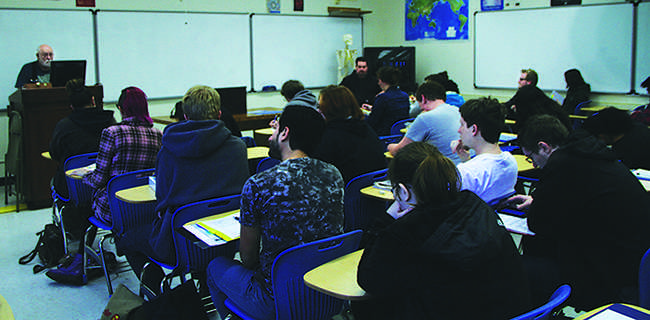Newcomers will likely find students enrolled in their classes who have been attending American River College for years and are essentially what can be called “career students.”
Students who have finished their general education and have attained associate degrees applicable to their future careers should not be allowed to continue their enrollment, as this puts a strain on class availability and costs California taxpayers a significant amount of money per year.
Before going into the discussion of whether or not these type of students should be allowed to take courses, it is imperative to talk about what is the function of community colleges and the role they play in the community.
A prime purpose of community colleges is to prepare students for their future educational pursuits at universities and other larger, more central institutions.
Community college’s role is to provide a platform for the community to be able to join the conversation of intellectual discourse.
The problem is that career students limit new students from being able to enter this discussion.
The seats that career students take up in a class could have gone to students who are working towards their AA degree or their transfer requirements.
Former acting ASB Student President Jorge Riley, who is also attending ARC, says he plans on attaining 150 cumulative units before transferring in pursuit of a law degree.
Riley, who has been a student at ARC since 2004, claims to currently have associate degrees in Liberal Arts and Business and plans on getting associate degrees in Real Estate, Business, Accounting, Forensics Accounting, and Paralegal in the next three semesters before leaving community college.
Riley says he feels that the argument over career students sways both sides, but that students benefit from studying alongside veteran ARC attendees.
“I guess you have to weigh the pros and cons, you know?” he said.
“I’m able to attribute a lot of the experience [I’ve received] to the students who are new and are not familiar with the system.”
While these experienced students’ input could be beneficial to new students, they would be more helpful by relinquishing their classroom seats.
The other side of the coin lies in this central question: How can a student who says he has been at ARC for twelve years be an inspiring example for other students, especially when the point of community colleges is to quickly assist students in getting them jump-started on their future careers?
Career students are not only taking up spaces in class, but the idea that they contribute experience and tutelage to new students is offset by the fact that there are already programs on campus that address the needs of bringing new students up to speed.
Career students, even unwittingly, also become a further burden on taxpayers.
Even though students are paying the full amount of the service fees, a portion of that is still being paid by the state.
The Board of Governor’s Fee Waiver, more commonly known as BOG, is a program for all community colleges in California that waives the payment of tuition for students that exercise financial need. Tuition per class is currently $46 a semester, according to the Los Rios Community District website.
Currently, there are no unit limit restrictions on who can take advantage of the program, any student that attends a community college can receive the waiver if they demonstrate financial need, sapping the ability for newer students to enter the community college level at the California taxpayer’s expense.
A student may argue that they couldn’t afford to go to a university, however financial aid is available. The max amount of units, according to the financial aid office of Sacramento State University, is set at 180 units.
If a student has surpassed that, they could try to file an appeal.
Community college is supposed to be the first step in obtaining an higher education, not the final destination.
Students should go off to the next step of their education career, and if they want to later learn a different discipline, they can come back to ARC.
These students have proved that they have what it takes to succeed at a community college, and they should find out if they can do the same at the next level.














